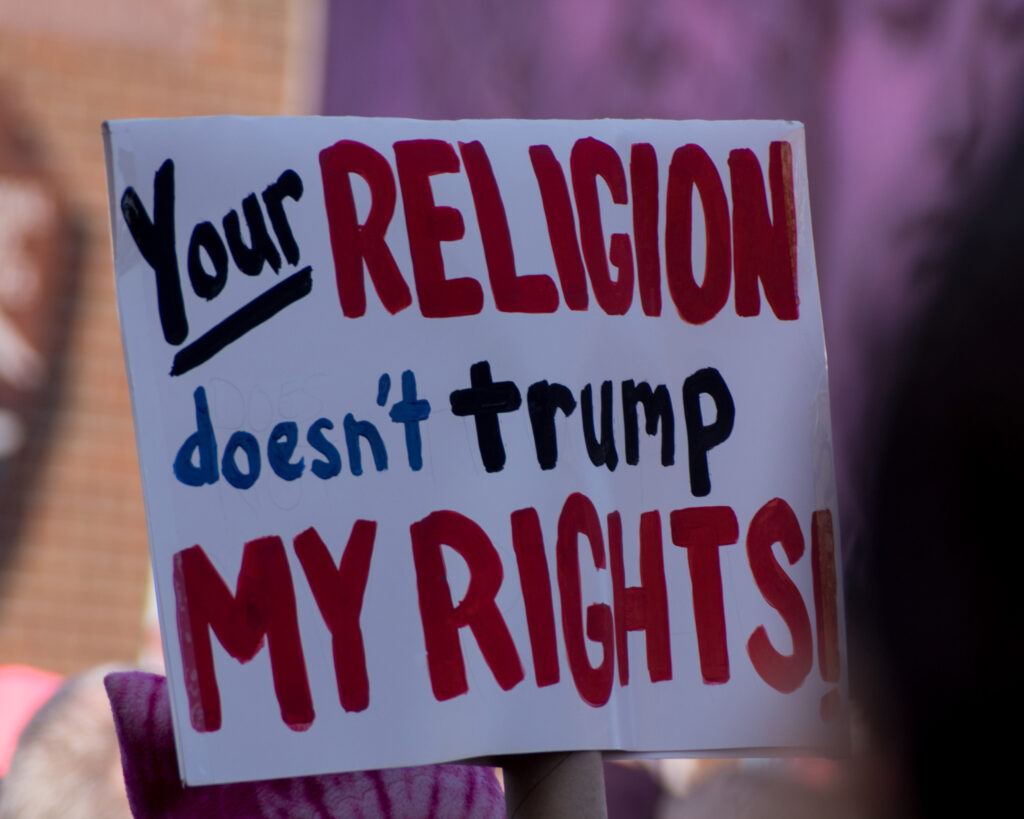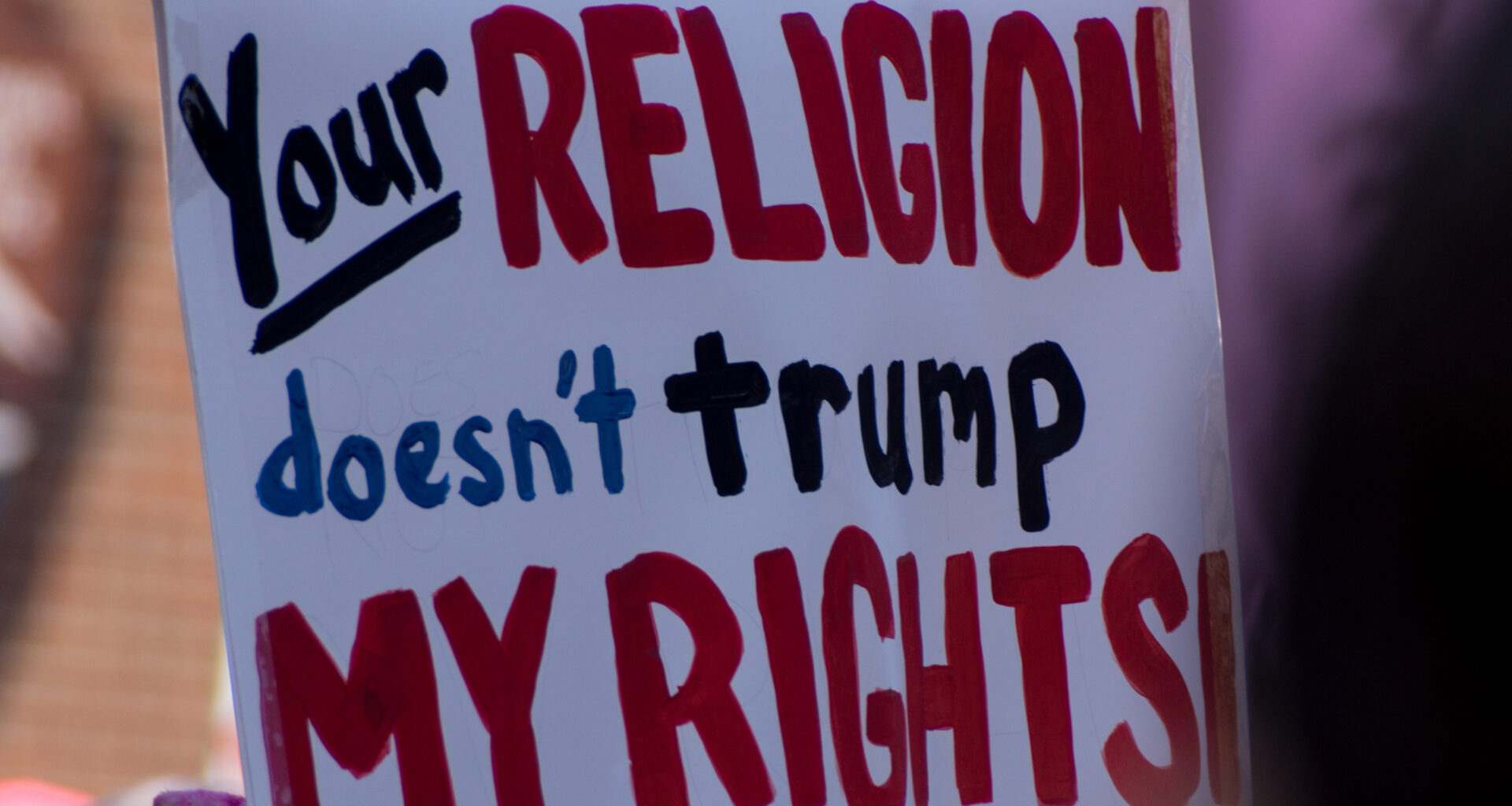The following article is adapted from a talk given to the Leicester Secular Society on 3 March 2024.

In 1877, a woman was put on trial for publishing what the prosecutor called a ‘dirty, filthy book’.
The book was a manual on rudimentary contraception, called Fruits of Philosophy. And the woman was Annie Besant – feminist, freethinker and vice-president of the National Secular Society. She and Charles Bradlaugh, the founder and president of the NSS, were both prosecuted for obscenity over this ‘dirty, filthy book’.
Besant’s story is extraordinary. In a highly patriarchal, highly Christian society, she fought fearlessly for the right of couples in Victorian England’s desperately poor and overcrowded slums to access information which would allow them to control their family planning. Alongside that, she fought for the right to free speech, and the right of women to control their bodies.
Incredibly, Besant’s ‘dirty, filthy book’ is still upsetting religious fundamentalists even today, nearly 150 years later.
Last November, the NSS held a history talk in London all about Victorian birth control, including the fight to publish Fruits of Philosophy. To our astonishment, our talk was picketed by an anti-abortion Christian group. This was particularly bizarre; the manual argued one of the main aims of contraception was to reduce abortion. But when questioned, the protestors revealed that their group is not just against abortion – they are against all forms of birth control.
While it was somewhat amusing that an anti-abortion group would embarrass itself by protesting against this small and rather tame history talk, it was also disturbing. The incident revealed the extent to which the religiously-motivated desire to control women’s bodies, women’s choices and women’s participation in society is still alive in Britain.
Secularism is a feminist issue. This was true at the time of Besant’s trial, and it is true today, worldwide.
The religiously-motivated desire to control women’s bodies, women’s choices and women’s participation in society is still alive in Britain.
The 2023 United Nations Gender Social Norms index found that there has been no improvement in worldwide biases against women in the last decade. It also found that gender hierarchies in religious practices can strongly influence behaviours and attitudes.
It is therefore perhaps unsurprising that in recent years we have seen some dramatic and devastating leaps backward – driven, in part, by fundamentalist religion.
In 2021, the Taliban re-took Afghanistan and immediately set about imposing its fundamentalist Islamic ideology on women and girls. Women there are now banned from most public places. To visit the few places where they are permitted outside their homes, they must now be clad in a burqa. Girls cannot attend school from over the age of 11.
Male doctors have been banned from treating female patients, a policy with deadly implications. Naturally, the Taliban ordered pharmacies to clear their stocks of contraception. Is it any wonder that since the Taliban takeover, Afghanistan has seen a surge in women attempting suicide?
Then there is Iran. Following the Islamic Revolution in 1979, the theocratic Iranian state has required all women and girls over the age of nine to wear hijab in public. Women who break this law are often subject to brutal punishment, as horrifically demonstrated in 2022 when Mahsa Amini died at the hands of Iran’s notorious ‘morality police’. She had been arrested for failing to wear hijab correctly. Witnesses saw her being brutally tortured in the back of a police van. She died days later. She was 22 years old.
Mahsa Amini’s death sparked huge waves of protest in Iran, which were described as the biggest challenge to the government since the Islamic Revolution. The regime’s response was to double down on its laws, rather than make any meaningful change.
But perhaps it is a matter of time. Consistent surveys find that most Iranians oppose mandatory hijab and, on top of this, support a secular state. Protests may have died down, but the mood of resistance has not been extinguished. As one banner displayed during international protests against Iran said: ‘To the world leaders. Iranian women do not need you to save them. They only need you to stop saving their murderers.’
Consistent surveys find that most Iranians oppose mandatory hijab and, on top of this, support a secular state.
So how are leaders in the UK responding to the brutal oppression and killing of women in Iran, Afghanistan and other countries where religion prescribes patriarchy and misogyny?
Well, the suffering of women forced to wear hijab did not stop UK schools, universities, and even the Home Office this year observing ‘World Hijab Day’ – an event which explicitly celebrates the veiling of women.
And it did not stop Sandwell Metropolitan Borough Council last year approving a 16-foot steel statue of a veiled woman for a park in Smethwick, Birmingham. The statue, called ‘The Strength of the Hijab’, was revealed to the public just days before the first anniversary of Mahsa Amini’s death. It is as if it was timed as an act of triumph against Iran’s courageous women who dare to show their hair; a tribute to the morality police.
Much of British authorities’ enthusiasm for the hijab comes from a concern to appear ‘respectful’ of minority groups. But an unwillingness to think critically about religious practices which are at odds with democratic values spells disaster for women’s rights. It also does Muslims a disservice by erasing debate and dissent from within that community.
This attitude is coupled with a fear of challenging religion – a fear which is, sadly, quite rational. There are now too many examples of people being accused of bigotry, losing their jobs, being threatened and even being physically attacked for questioning, criticising or poking fun at religion.
And it is something that schools with concerns about hijab have had to face. In 2017, St Stephen’s Primary School in east London told parents that girls under eight should not be sent to school in hijab, because of concerns about integration and the promotion of ideologies which are incompatible with British values. This sparked a furious backlash from Islamist fundamentalists, who bombarded school leaders with emails, many of which were threatening. As a result, the school backed down on its policy.
Decision-makers in the UK still operate under the belief that religion is a wholly positive force that should be respected, accommodated and showcased, not something to be questioned. This is particularly evident in the charity sector.
Incredibly, there are registered charities promoting the idea that husbands can dominate and even beat their wives, and that women who dress ‘sexily’ (for example, by wearing trousers) are to blame for rape. We have even seen charities signposting material which says the torturous and illegal practice of female genital mutilation has benefits, including reducing ‘excessive sensitivity of the clitoris’ which is ‘very annoying to the husband, especially at the time of intercourse’.
These charities do this in the name of religion. ‘The advancement of religion’ is a recognised charitable purpose in law. [On the problems with the ‘advancement of religion’ provision, see further in the Freethinker and New Humanist – Ed.]
As long as a charity is registered under this purpose, it seems to have carte blanche to say just about anything. Charities are meant to provide a public benefit in return for the generous tax breaks and Gift Aid they get. But it is difficult to see how promoting misogyny benefits the public – at least the female half of the public.
Decision-makers in the UK still operate under the belief that religion is a wholly positive force that should be respected, accommodated and showcased, not something to be questioned.
The fact that the state is willing to forgive misogyny when it is cloaked in religion reveals just how normalised it is. And what else could we expect, when the UK’s own state religion, the established Church of England, is itself drenched in sexism.
It is quite incredible that in the 21st century, 500 Anglican churches ban female priests. The Church has said this is because it is ‘committed to enabling’ those who are ‘unable to receive the ministry of women bishops or priests’ to ‘flourish’.
The established Church’s commitment to helping chauvinists within their ranks ‘flourish’ tacitly implies that there is something so subversive about women with authority that it is reasonable for men to reject them.
Let us not forget that as the established church, the C of E is part of our state. The lines between theology and politics are blurred when it comes to a state church. This is institutionalised, structural sexism at the highest level.
Religiously sanctioned notions that women exist to serve men translate into decision making which limits women’s opportunities, and feed into relationships which are coercive, controlling and abusive.
While women’s rights in the UK have inarguably progressed, women are still under-represented in positions of power and overrepresented as victims of domestic violence. A meagre seven per cent of FTSE 100 companies had female CEOs in 2023. Only 35 per cent of members of the House of Commons and 29 per cent of the Lords are female. According to Refuge, one in four women in England and Wales will experience domestic abuse in her lifetime, two women a week are killed by a current or former partner, and domestic abuse drives three women a week to suicide. Ninety-three per cent of defendants in domestic abuse cases are male while 84 per cent of victims are female.
To protect the rights of women and girls worldwide, we must not allow religion to pull the veil over our eyes when it comes to injustice, discrimination and oppression.
If Annie Besant were alive today, what would she think?
While she would no doubt welcome the many successes achieved by feminists and secularists in improving equality for women, I think she would also be dismayed and bewildered at the numerous and complex threats posed to women by fundamentalist religion today.
Progress on women’s rights can only go so far if we only treat the symptoms of misogyny, and not the causes. And one of the most important causes is patriarchal religion, which is not only tolerated by the British state, but nurtured, protected and endorsed.
That is why, to protect the rights of women and girls worldwide, we must not allow religion to pull the veil over our eyes when it comes to injustice, discrimination and oppression.
We must be free to look religion in the eye, to challenge it, and to criticise it in the strongest terms, without fear of punishment by society or the state.
We must stop letting religious extremists exploit our good intentions to promote pluralism and inclusivity by portraying symbols of misogynistic oppression as symbols of social justice.
And we must separate church and state to ensure women’s rights are never subordinated to religious agendas.
The National Secular Society is holding a free online talk on April 10th with Michael Meyer, the author of a new biography on Annie Besant. More information and booking here.








Your email address will not be published. Comments are subject to our Community Guidelines. Required fields are marked *
Donate